
As a young Economics and Business Management student, Eduardo Vargas Castañeda wanted to validate whether his dream career was feasible. Obtaining an IATA training certificate set him on a path to reach his goals.
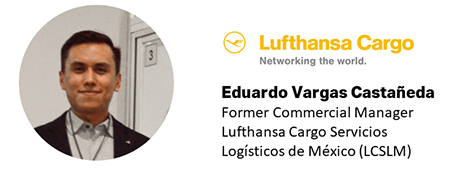
Formerly reporting to the Managing Director, Eduardo ensured the availability of key decision-making data so that operations ran smoothly and profitably. LCSLM is the #1 airfreight warehouse handler at Aeropuerto Internacional de la Ciudad de México.
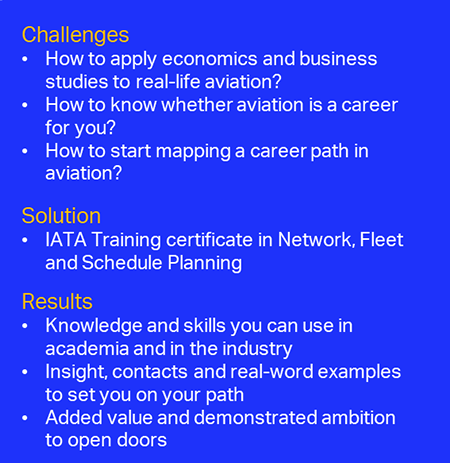
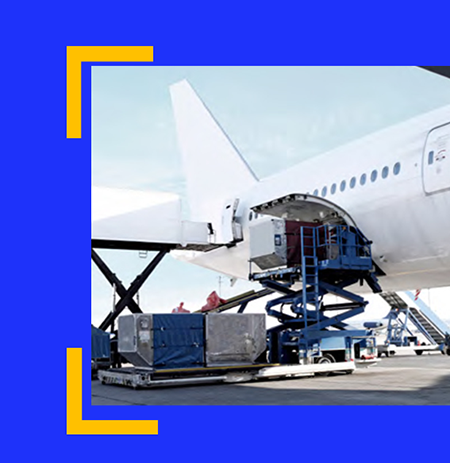
From the moment I took my first flight from Mexico City to Cancún at the age of eight, I knew I wanted to work in aviation. Every school project I did, I tried to make about the industry. Then, as a final year student in the undergraduate Economics and Business Management program at the University of Sheffield, in the UK, I was able to do a study on the impact of Sheffield-Doncaster airport on economic development, which was a real opportunity to pursue my passion. But that project made me realize that broad economics knowledge is not enough for such a complex industry. Wondering how I might apply what I was learning in my degree program to the industry, I started looking around for aviation-specific training. As I looked, my objective became clearer: I wanted to see if aviation really was for me, if I had what it takes to succeed, and what my career path might be. To validate these three points, I wanted a training course that would give me insight into the workings of the industry, and exposure to industry professionals, so I could measure myself against them.
IATA’s Network, Fleet and Schedule Planning course appeared to offer everything I was looking for. To me, network, fleet and schedule planning are really the core business of air transport, and all about optimization. At the time, I was learning about optimization in my degree program, so this represented the perfect opportunity to apply what I was learning. Additionally, the course offered activities to socialize with my classmates at the end of the day, which would enable me to get an insider’s view on working in the industry. Although there is a wide range of training on offer, IATA is certainly a reference. Not only is it known worldwide, it’s an organization that influences change in the industry, and my goal was to get real exposure to the industry. I was, however, a little apprehensive about whether I would fit in on a course designed for industry professionals. Finally, I decided to do it, reassured by one of my professors, who had worked at IATA, and inspired by Alexandre de Juniac’s rallying cry that “aviation is the business of freedom”, as well as by IATA Training advertising calling on people to be “drivers of change”.
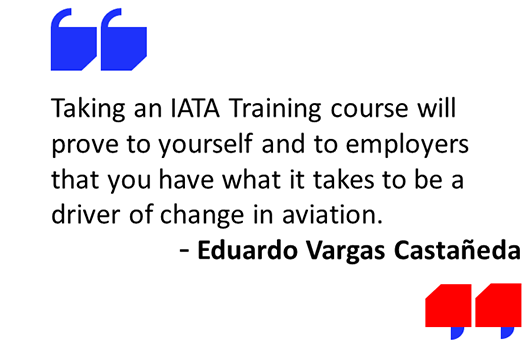

Before I started the course, and from my perspective as an undergraduate student, I imagined it to be “we teach you this; you do an exam”. Consequently, I was a little overwhelmed by the 300-page manual I received, and the idea of being examined on it! The reality was quite different, however.
The course content was full of real-life problems and situations, and I really liked the case studies. The end goal is for you to develop an airline network that’s efficient and profitable, so you’re learning while you’re doing. Our instructor knew how to stimulate discussion between the participants so they shared their experiences, and how to ask questions that really make you think. As a student, and not yet a professional, I really appreciated how he made everyone feel part of what was going on. He was passionate, highly experienced, and very practical. He also really encouraged us to build our network, putting us in groups to work on the assignment, and mixing people up during the coffee breaks, so we had even more opportunities to get to know each other. It really gave me exposure to the professionals I was looking for, especially as I was teamed with an engineer from Embraer and KLM.
Overall, the training more than lived up to my expectations. Everything was high quality, from the smooth onboarding process, through the training itself, my fellow participants, the staff, the welcome, the venue next to Schipol airport. I also met my goals. I was able to apply things I had learned, such as the “best reaction function” from my degree program’s mathematics course, which I used to assess how the competition might react. I got exposure to the workings of aviation and to its professionals, which proved to me I was ready to be part of the industry. And I learned that I wanted to work in operations and commercial teams.
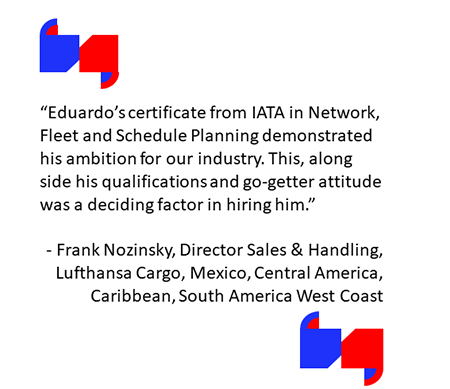
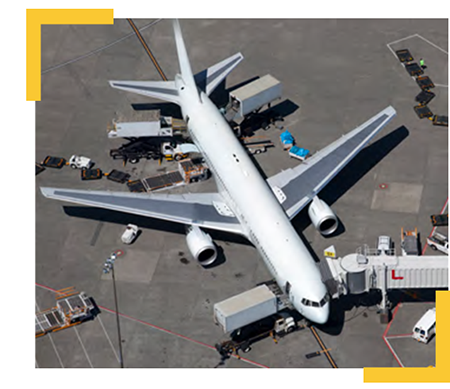
Completing this course gave me an enormous amount I was able to use as I finished my degree program. We had, naturally, looked at the hub-and-spoke model, which I came across again in a computing course during my Master of Science degree. Due to what I’d learned, my approach to the coding project was more commercial, asking myself, what else do I need to consider? How will stakeholders react? But I didn’t just learn network development skills, I also sharpened my soft skills and developed a positive work attitude. A weeklong course working towards delivering a complete project really improves your time management, your ability to work under pressure, and your team-spirit and teamwork.
Of course, it’s also had a huge impact on my career. First, it has given me added value and opened doors. When I interviewed with my boss at Lufthansa Cargo Services in Mexico, he was surprised I had a certificate from IATA Training at my age. Once I started my professional life, I began to see the other benefits. Network planning taught me to see the big picture, all the connections between components, and I’m using that now as we add a flight to our services here. I’m evaluating the potential impact on hub operations, assessing how our competitors might react, considering what the turnaround time of the aircraft is, and all the logistics to keep operations efficient. I’m also looking at how the business model works, so I can explain it to our clients.
Taking such a course also gave me the confidence to express my ideas and face different situations. Inexperienced as I was, I was treated the same way as everyone else. Everybody’s ideas were listened to, and my ideas influenced what my team did on our project. Now, when I have meetings with board members, I’m not intimidated, and I put forward what I think. As I advance in my career, I see this being key, enabling me to be a driver of change, in operational sustainability, for example.
I would definitely recommend doing this course, particularly to any young aviation enthusiast who wants to make a career in the industry and is not sure whether they should get training or not, especially now that opportunities are fewer. I say, “go for it!”. You need to understand the heart of aviation, and network, fleet and schedule planning is about connecting people, about networking the world. Aviation is a challenging industry, and this is a great introduction, a good reflection of what the industry is really about. Plus, you’ll network with aviation professionals, and learn lots of soft skills. The industry looks for positive attitude and ambition, and qualifications like this will give you a boost.
In dedication to my family and a great mentor, Frank Nozinsky who have shown continuous support throughout my career.
Curious to learn how Network, Fleet & Schedule Planning can help your career?
Download the outline to explore the course, its objectives and key topics